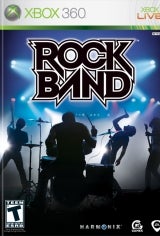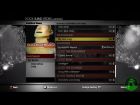Band Play
While there's plenty of gameplay to be found in Rock Band's solo tours, there's no doubt the highlight of the game is the ability to play as a band of up to four players: a singer, guitarist, bassist and drummer. Considering it's the first time anyone's tried this, the gameplay is amazingly well-realized.
With a full four players, Rock Band's gameplay screen is split into three columns, showing the drum track in the middle and guitar and bass on each side. The lyrics scroll across the top of the screen, and it all turns out to be pretty clean. The left side of the screen has a meter with icons for all four instruments showing how well each is doing, and an overall band score appears in the upper right.
Beyond these basic elements, there's a lot happening on-screen. The drums and guitars each have their own energy bars and score multipliers shown underneath their respective note tracks, and the overall score shows a band multiplier as well as your current star rating; in a nice touch, a circular border slowly fills around each star, so you can tell how close you are to getting 4 or 5 stars.
One of the keys to getting big scores as a group is using the band multiplier. In addition to each player's individual bonuses for consecutive note streaks, the entire band gets their scores doubled for anyone who activates Overdrive. This means that with everyone activating at the same time, your guitarist, drummer and vocalist can have their scores multiplied up to x32; since your bassist can have a x6 streak, they can actually go as high as x48. This is the quickest route to huge scores: save energy for sections where the entire band is pretty busy, activate Overdrive and keep streaks going.
Of course, on some songs it'll be a challenge to simply make it to the finish line, especially as band members hear songs for the first time. It's more than possible for band members to fail a song at any time, but it's possible for other players to "save" them and bring them back into the song by activating Overdrive (assuming they have energy saved up). For every moment someone has failed out of a song, the overall band meter plummets, so it's important to rescue him/her quickly before the entire band fails. There's a limit to the heroism, however: if one person fails three times, they're out for good, likely taking the entire band with them (unless it's the very end of a song).
As you play more and more as a group, you find that all four band members turn out to be pretty well balanced in terms of their importance. Having a vocalist who can keep streaks going during big multiplier sections is huge for scoring. A solid bassist can keep rescuing band members during tough sections. And a drummer who can keep a steady beat is incredibly useful: since you can actually hear them beat the drums in the same room, they wind up keeping time for the band, and if they're too fast, slow, or erratic, they'll throw the entire band out of whack.
The last general gameplay mechanic worth mentioning regarding the band play are the unison phrases and big endings. During some songs, you'll occasionally see a "Unison Phrase" section that offers bonus points if the band can keep a streak going. And many songs have ending sections where you can just flail away randomly on your instrument to rack up bonus points, with the catch being the entire band has to hit a few specific notes at the end to actually get the points.
Even without the Band World Tour mode (which we'll cover shortly), playing as a band is an experience unlike anything seen in videogames before. Early on, your band will just be thrilled to get 5 stars on songs without anyone failing and maybe break a million points, but soon you'll be functioning like a real band, with your drummer keeping time during empty sections and players calling out Overdrive activations. Considering this is the first time anyone's ever tried making a game like this, it's amazing that it feels so polished right out of the box.





